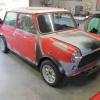Yes is is always stated weather to dry torque or wet torque as the before mentioned it affects the locknuts rundown as has been calculated as such. I wouldn't lube a Nyloc unless i was lubing it with lock tight ;) HAHA
one step further it will normally state to clean certain critical components with alcohol of type to degrease and dry the threads. on top of this, again probably specific to aircraft... we have a lot of one use only bolts and nuts, it wouldn't be viable to do this in a hobby car environment but again it just ensures the correct torque is always being applied.
last bit, anything that you torque on the car, torque 3 times... have a cuppa... torque again and the nut shouldn't move not even a 10th of an inch... if it does back to step one.... if it passes another cup of tea and try again in another 10 minutes. I've had bolts that have been torqued this way and have lost torque over night when things move or sit, or the temperature drops. and things like the head on the engine need to be torqued in sequence to get the correct loading. follow it and check them again in 25-50 miles of driving just to be safe and sure ![]()
















